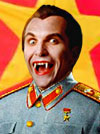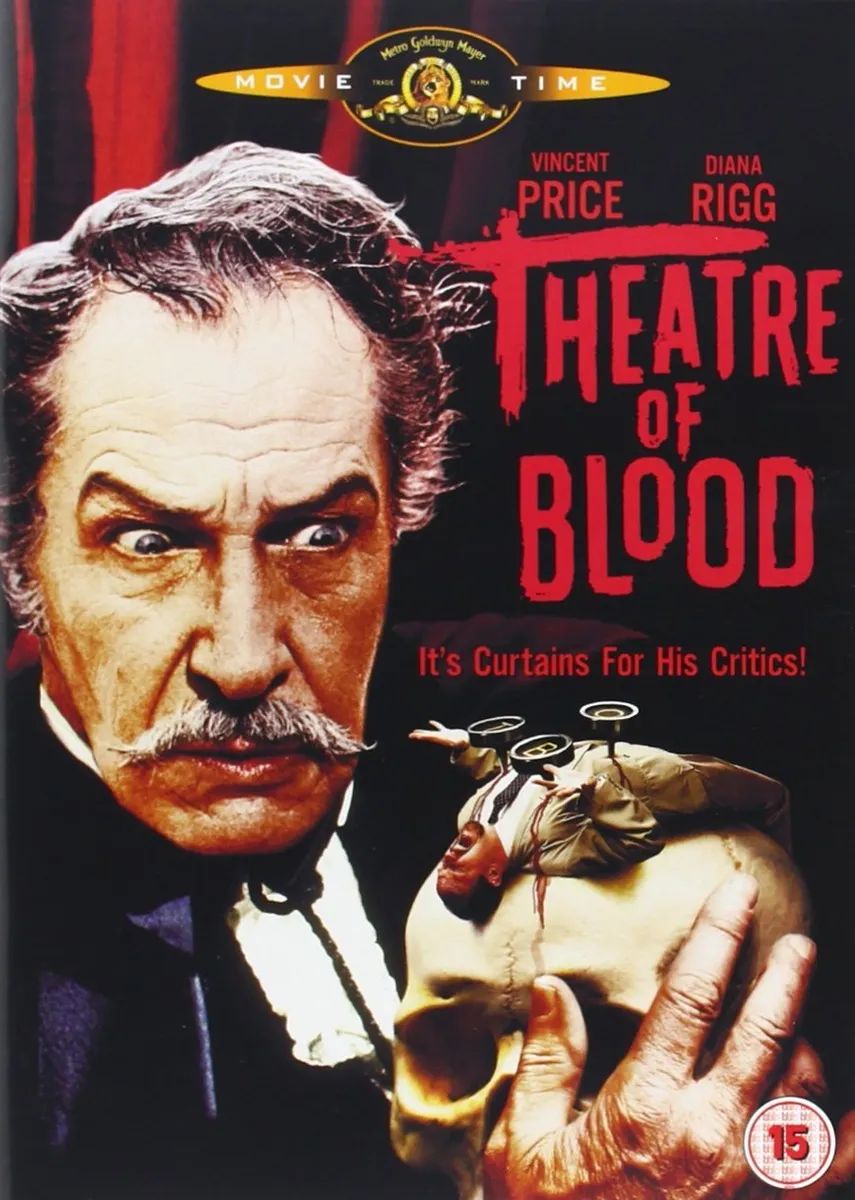|
Theater of Blood Film review by Thomas M. Sipos |
|
MENU Books Horror Film Festivals and Awards
Pursuits
Blogs Horror Film Festivals and Awards
Other
|
Theater of Blood (British 1972; dir: Douglas Hickox; scp: Anthony Greville-Bell; cast: Vincent Price, Diana Rigg, Ian Hendry, Jack Hawkins, Harry Andrews, Coral Browne, Diana Dors, Robert Morley, Michael Hordem, Dennis Price; aka Much Ado About Murder)
But Theater of Blood also has ... blood. Blood aplenty. And class, and style, and pathos, and hilarious black comedy, and ... Vincent Price. In the film, Price portrays Edward Lionheart, a hammy, egomaniacal Shakespearean actor who fails in a suicide attempt after being passed over for a Critic's Circle award, then uses his second chance at life to kill his critics by methods drawn from Shakespeare's plays. Opening credits play over old silent film footage of Shakespearean actors. While nothing in Theater of Blood indicates that Lionheart ever worked in film (it's stated he never performed anything other than Shakespeare), Lionheart, like Norma Desmond, belongs to an earlier era. Lionheart predates the rise of The Method in the 1950s, with its "naturalistic" acting style often derided by practitioners of "classical theatrical style" as producing actors who dressed dirty and mumbled incoherently. (Marlon Brando and James Dean were accused of such). Lionheart accuses his critics of denying him the award to give it to a youth "who can barely grunt his way through an incomprehensible performance." Lionheart's egomania shows when he kills one critic by cutting out his heart, thereby altering The Merchant of Venice. Lionheart's arch-foe, critic Peregrine Devlin (Ian Hendry), remarks, "Only Lionheart would have the temerity to rewrite Shakespeare." Not having a son to christen Edward Jr, Lionheart names his daughter Edwina (Diana Rigg). That Lionheart wanted a son is implied by Edwina's usual disguise of male clothing and mustache, by her incessant (insecure) desire to please him, and by finally dying happily in his appreciative arms, happy to have served him well. A darkly comic commentary on the shared egomaniacal roots of artists and political activists is drawn when Lionheart concludes a thunderous oratory to his ragged street devotees, followed by a recording of a speech by Hitler (a former artist) inadvertently played on Lionheart's applause machine.
Theater of Blood depicts an actor's exaggerated view of critics. They can afford expensive homes and lavish offices, exploit young actresses for sex, and expend more effort in writing clever insults than in staying awake to see a complete play. They enjoy hurting actors. Devlin confesses to the detective inspector that when Lionheart broke into the Critic's Circle meeting after losing the Best Actor Award, they had fun at his expense. Critics are twice criticized for their abuse of power. Once when the detective inspector suggests possible motivations as to why someone may want to kill them. A second time when Lionheart justifies his murders to Devlin. In both instances, the point is made that a negative review can close a production, ruin reputations, bankrupt people, destroy lives. Few, if any, critics have such power today (perhaps more so in theater than in film, more so in Britain than in the U.S.). But to insecure actors in an insecure profession, reviews take on exaggerated importance. If Lionheart is an egomaniac, his critics are worse. They too have egos, but they lack Lionheart's cunning intelligence and perverse imagination. One lecherous old man readily accepts that a young actress (Edwina) is flirting with him. Another is unsuspicious when Lionheart selects him alone to report the exclusive story of Lionheart's comeback. Another sees nothing amiss with a TV crew arriving unannounced at his house, himself the center of attention. Another shrugs off Princess Margaret's hairdresser coming in after-hours, especially for her. Another agrees to help police toss out squatters, because the police need someone with an air of authority (something the police lack!). All traps by Lionheart, all successful because these critics' egos block their brains. The one critic who survives is Devlin, who doesn't trust Edwina's pretty, frightened daughter act. Devlin tells her there is a homing device in the car's glove compartment, but not about the police constable in the trunk. He is also the only critic of those given time to recant, who refuses to change his critical opinion of Lionheart's abilities (others deny their past comments or agree to everything Lionheart says). There is a nascent astrology motif. One critic's wife cautions him about his horoscope. Another critic wears a huge gold Scorpio medallion around his neck. Most likely, this is merely reflecting the times. Theater of Blood's gruesome murders are leavened with campy black comedy. Even as Lionheart decapitates one critic, he rolls eyes at Edwina's theatrical handling of medical instruments. And his forcing one effete critic (Robert Morley) to eat his poodles, baked in a pie, is a classic scene of horror black comedy.
Theater of Blood is a sumptuous production with lavish sets and costumes. Extreme high and low camera angles heighten the melodrama. The sudden switch from a straight-on to extreme high angle just as the critics open the drapes to view Lionheart about to jump off the balcony creates a sense that we are looking down on a stage with the curtain opening upon a performance. Anthony Greville-Bell's literate script artfully integrates select Shakespearean dialogue into contemporary proceedings that are alternatingly macabre, comic, or poignant. The musical score supports the story, shifting from gentle to dramatic as required, without ever overwhelming events on screen. However melodramatically the music swells, Lionheart matches it. Vincent Price shines. A year later, tables were turned on Price in Madhouse (aka The Revenge of Doctor Death). In this film, Price is a has-been horror film star victimized by frustrated writer Peter Cushing. Yet while vengeful writers have their own subgenre, Theater of Blood's enduring fame compared to Madhouse's relative obscurity demonstrates why actors get the glory while writers more often toil in anonymity. Lionheart's extroverted exuberance, shameless scene-stealing, and indestructible ego is a crowd-pleaser, easily steamrollering over the vengeance meted out by cool Cushing's introverted writer. As the tabloids have long known, actors make for colorful villains, which is why they get the cover while writers must settle for a byline. Theater of Blood is bloody good entertainment: horrific, insightful, and wryly humorous. Review copyright by Thomas M. Sipos
|
"Communist Vampires" and "CommunistVampires.com" trademarks are currently unregistered, but pending registration upon need for protection against improper use. The idea of marketing these terms as a commodity is a protected idea under the Lanham Act. 15 U.S.C. s 1114(1) (1994) (defining a trademark infringement claim when the plaintiff has a registered mark); 15 U.S.C. s 1125(a) (1994) (defining an action for unfair competition in the context of trademark infringement when the plaintiff holds an unregistered mark).

 Although
Although 